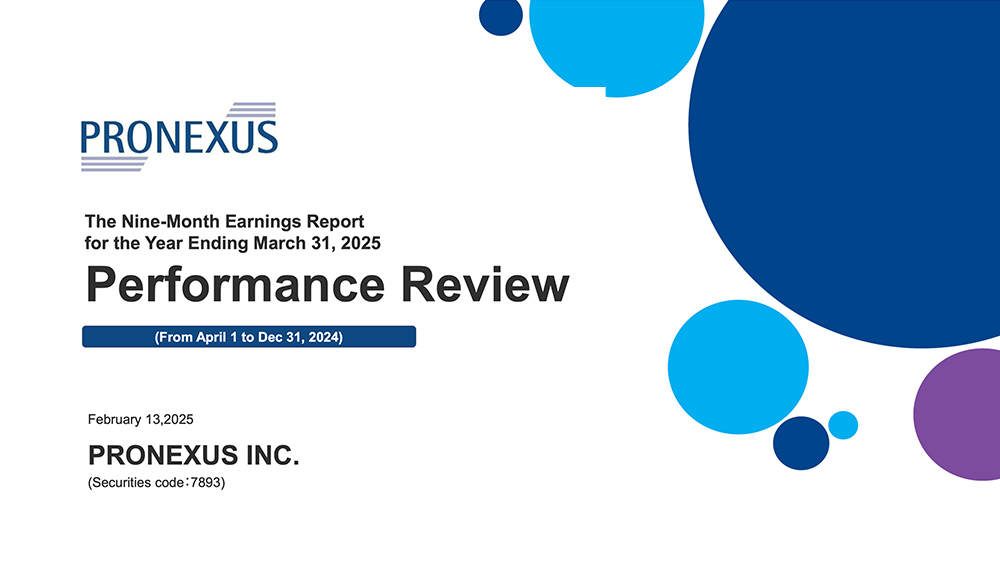IR information
Business risk factors
Risks and fluctuation factors that may possibly affect the operating results and financial condition of the PRONEXUS Group (the “Group”) as well as other significant related matters are noted below. The Group will work with sufficient awareness of these risks to avoid them as much as possible, and we will also maintain efforts to appropriately respond to such incidents should they occur.
1. Risks associated with the handling of confidential and insider information
The Group handles confidential data prior to disclosure by corporate clients, including insider information, and, therefore, places the highest priority on securely managing confidential information. If such information is leaked or compromised, the Group’s business performance could be affected. Therefore, to prevent such incidents from occurring, the Group has established and promotes a group-wide insider information management system, and promotes responses to “risks associated with information security and business continuity,” as presented in a separate paragraph. Furthermore, the Group has implemented a wide range of measures to protect confidential information. Specifically, it requires relevant parties to sign confidentiality agreements, periodically trains and tests relevant personnel, enforces strict confidentiality rules and monitors their implementation status, designates separate office areas for handling confidential information, restricts personnel authorized to handle such information, operates a traceability system, has set up an Information Security Committee that meets regularly, and carries out related educational activities.
2. Risks regarding to information security and business continuity
The Group implements measures for maintaining the stable operation of the systems it uses to provide services, and duplicates the functions of important systems. It has also established contingency plans in preparation for unforeseen problems. Nevertheless, the Group’s ability to provide its system-based services could be hindered by a number of factors, including human error, an accident, a cyber-attack, a disaster, or a power outage.
Cyber-attacks, in particular, have become more technically sophisticated in recent years, increasing the risk of computer virus-related data leaks and service disruptions. Accordingly, the Group’s management places great importance on cyber security. The Group has initiated measures at the infrastructural and organizational levels in accordance with its own basic policy on information security as well as guidelines on managing cyber security issued by Japan’s Ministry of Economy, Trade and Industry. Specifically, facilities have been equipped with multilayered cyber defense capabilities, and a Computer Security Incident Response Team (CSIRT) has been set up. In addition, the effectiveness of the Group’s cyber security is periodically evaluated in risk assessments conducted by third-party organizations.
3. Impact of relevant legal and regulatory changes on volume of orders
The Group’s principal business is the provision of support services related to the production of legal disclosure documentation and the compilation and printing of relevant data for corporations. Many of these disclosure documents are specified in the Companies Act and the Financial Instruments and Exchange Act. Thus, revisions to laws and relevant regulations could alter the demand for such products and services, as well as their specifications and content. For example, based on a revision to the Companies Act announced in December 2019, documents for shareholders’ meetings had to be digitized within two to three years. If such revisions result in an increase in the page volume required for legal documentation or the introduction of new services, it could have a positive effect on Group sales. On the other hand, however, if it results in lower demand for printing services due to digitization of some or all of printed materials, a reduction in the total page volume or a drop in orders for a specific product, it could have a negative impact on sales. To mitigate such risks, the Group is implementing medium-term management strategies that place importance on developing and channeling substantial investment in services, solutions, and new businesses that are not easily affected by the legal system.
4. Impact of changes in securities market conditions on volume of orders
Among the products and services offered by the Group, prospectuses and sales materials for initial public offerings, financing, and investment trusts are sold to companies in the securities market and thus changes in the securities market affects orders for these documents, and, therefore, could have an impact on the Group’s business performance. To mitigate such risks, the Group is working to secure more orders for products that are not easily affected by the securities market, including orders for disclosure documents that are published periodically, such as convocation notices for shareholders’ meetings, annual securities reports, and quarterly securities reports, as well as orders for systems and consulting services for improving clients’ business efficiency and precision, and investor relations-related products and services.
5. Risks associated with seasonal fluctuations in businesses
The Group owes approximately two-thirds of its revenue to Japanese listed companies. Because roughly 65% of these companies close their books in March, orders for products related to account settlements and shareholders’ meetings peak in the first quarter. Consequently, revenue in the first quarter is more than those of others as shown in the table below. Therefore, orders accepted in the first quarter have a major impact on full fiscal year results, making it essential to secure enough production capacity to handle those orders. There is a risk of deteriorating earnings, however, if excessive production capacity is maintained in other quarters of the fiscal year since order volume is lower in those periods. To manage these fluctuations in order volume, the Group has raised the productivity of its own production facilities to increase the amount of output it can handle in-house, and also outsources production to leading producers during the busiest time of year. In these ways, it has put a framework in place for both securing enough production capacity and keeping costs low. In addition, the Group is working to expand into services for which demand can be expected year-round and seasonal variations are comparably minor, such as services related to financial instruments, disclosure support systems, business process outsourcing (BPO), and databases.
| Q1 (Apr.-Jun.) |
Q2 (Jul.-Sep.) |
Q3 (Oct.-Dec.) |
Q4 (Jan.-Mar.) |
Year total | |
|---|---|---|---|---|---|
| Revenue (Millions of yen) | 9,481 | 4,602 | 5,161 | 5,202 | 24,446 |
| Composition ratio (%) | 38.8 | 18.8 | 21.1 | 21.3 | 100.0 |
6. Risks associated with market competition
There are companies in competition with the Group operating respectively, in the fields of listed company disclosure and IR, as well as in the field of financial instruments disclosure, which are the main business fields of the Group. Since these competitors offer the same types of products and services, the Group must constantly differentiate its solutions, provide higher quality, offer a broader range of support, and be cost competitive in order to win new orders from clients. If market shares change or the value of orders declines as a result of this competition, the Group’s consolidated revenue and profits could be impacted accordingly. While market competition is unavoidable, the Group works to raise the quality and performance of the services it offers. It also strives to avoid competitive risks and create more opportunities for securing profits and growth by developing new solutions for a wider range of clients’ businesses, providing BPO services, and expanding into new markets that have fewer competitors to allow the Group to leverage its strengths.
7. Risks associated with natural disasters and pandemics
In the event of a natural disaster, such as a major earthquake, storm or flood, or of another pandemic like the recent outbreak of COVID-19, the Group may be forced to suspend or discontinue its main business of producing disclosure documents and providing related support. Moreover, discontinuing the production of legally required disclosure documents, including convocation notices of shareholders’ meetings and annual securities reports, could also affect important decisions made by corporate clients and their ability to procure funds, and even affect the functioning of capital markets.
To manage such risks, the Group has equipped its facilities and prepared personnel in accordance with various rules and regulations related to business continuity. For example, as explained in 2 above, steps have been taken to minimize information system suspensions or stoppages caused by unforeseen problems, such as by duplicating the functions of important systems. Furthermore, the Group has put systems in place to ensure the safety of employees, enabled teleworking, and prepared for personnel transfers to different locations as measures for dispersing risks. Combined, these countermeasures are designed to help clients continue disclosing information during an emergency.
The Group’s document production processes are mostly digitized and paperless, but for processes like printing, it is essential for employees to work onsite. Therefore, in response to the recent outbreak of COVID-19, in addition to the countermeasures above, the Group has been taking steps to prevent workplace infections by staggering work hours, allowing shiftwork, and spreading out office space, thereby facilitating the safety of employees while also ensuring the continuation of its disclosure support services.
8. Risks related to M&As and capital and business alliances
With the aim of expanding business areas and utilizing external resources, the Group may engage in acquisitions of other companies, investments in other companies, and the formation of alliances and cooperative structures with other companies. When implementing M&As and similar activities, we conduct thorough due diligence to assess the risks and profitability of the target companies or businesses, as well as the feasibility of investment recovery. However, particularly in the IT sector, the desired amount by sellers can escalate due to supply and demand conditions. Such factors could lead to an implementation of an M&A, potentially resulting in temporary increases in costs and adversely affecting the Group’s business performance in the short term.
Moreover, if the anticipated profits and investment recovery do not proceed as originally planned, impairment of goodwill and other losses could adversely impact the Group’s business performance.
9. Risks related to securing and training human resources
The Group considers it to be crucial for future growth to secure and train human resources to be able to respond to the increasing order volumes and business area expansion. Particularly in growth sectors centered around “non-printing fields,” there is an urgent need to secure professionals with specialized knowledge and experience. We are focusing on revising our human resource systems and developing in-house training systems to address this. However, if the securing and training of excellent human resources do not proceed as planned, it could potentially impact business expansion, business performance and growth prospects of the Group from a long-term perspective.



